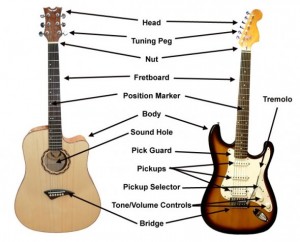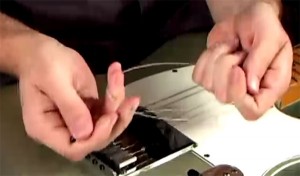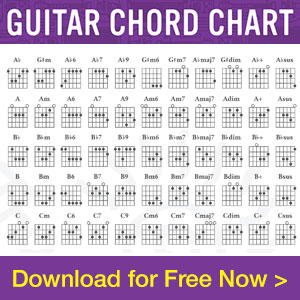How to Play Guitar: The First 10 Things Beginner Guitar Players Should Learn
1. Guitar Anatomy
 Before you learned to drive a car, you were taught about all the knobs, buttons, and gears. Same goes with learning how to play guitar. Before you can start playing, you need to know where everything is and what everything does. From the bridge to the headstock, take some time to get to know the guitar.
Before you learned to drive a car, you were taught about all the knobs, buttons, and gears. Same goes with learning how to play guitar. Before you can start playing, you need to know where everything is and what everything does. From the bridge to the headstock, take some time to get to know the guitar.
Here, this might help. It’s a visual anatomy of all the components for both acoustic and electric guitars. We recommend looking over something like this to fully understand how everything works.
2. How to Hold a Guitar
This may seem elementary, but if you’ve never sat down with a guitar before, you might feel totally lost. Learning how to hold a guitar properly by positioning your left hand on the neck and right hand over the soundhole are essential to creating the best possible sound out of your guitar.
Lefty? Not to worry, there are solutions for you! One fix is to flip the guitar strings around – completely reversing the strings – and hold the guitar with your right hand on the neck. The other option is to flip the guitar over without restringing. The second option is more for the type of person who bores easily with Rubik’s Cubes and Mensa puzzles.
3. How to Tune a Guitar
Nothing halts learning how to play guitar faster than practicing on an out-of-tune guitar. We’ve all been at the point of learning guitar where we know a couple chords, but not how to tune the thing! That’s why we’re recommending you learn how to tune a guitar before anything else!
Investing in a tuner will never do you wrong. Better yet, use our free online guitar tuner. If you’re without phone or tuner, try using the 5th fret technique.
4. How to Re-string a Guitar
 There’s going to come a time while learning how to play guitar when your shiny new strings will lose their luster. You’ll know this when the strings look discolored, the guitar’s harder to tune, or the sound is flat or off. Knowing how to replace the strings is a great skill and will ensure your guitar’s always sounding its best.
There’s going to come a time while learning how to play guitar when your shiny new strings will lose their luster. You’ll know this when the strings look discolored, the guitar’s harder to tune, or the sound is flat or off. Knowing how to replace the strings is a great skill and will ensure your guitar’s always sounding its best.
Your local guitar shop can give you advice on the best string for your guitar, playing style, and level of skill. While the process is simple, there’s some useful tips and tricks you can pick up on videos like this one.
5. How to Hold a Pick
In case you’re totally new to learning how to play guitar, the pick is the small plastic tool used to strum the strings on the guitar. Picks are super cheap and are super easy to lose. So grab a bunch!
While you don’t always hold a pick when playing guitar, it’s still a very essential guitar skill. The basic rule is: Place the pick between the tip of your first finger and your thumb. Of course, you’ll figure out your own specific holding style once you get in the groove of playing.
There are different styles of picks ranging from thin to thick. We recommend starting with a thinner pick as they are much more forgiving for the beginner player.
6. How to Read Tabs and Chords
 Reading tabs and chords are actually very simple. What you’re looking at is actually a diagram of exactly what strings to press, and with which fingers.
Reading tabs and chords are actually very simple. What you’re looking at is actually a diagram of exactly what strings to press, and with which fingers.
A great trick to learning to how to play guitar and play chords is to learn simple songs like Bad Moon Rising. By learning a cover, you get more familiar with reading chords, and you practice transitioning between chords.
Check out our free guitar chord chart to learn tabs and guitar chords.
7. How to Play Open Chords
Open chords are, to put it simply, chords that don’t have all the strings pressed down. They are often one of the first skills a guitarist will nail down when learning how to play guitar.
Here’s your quick open major chords lesson: Start with a very basic open chord, like G. Then, strum the guitar to make sure you’re hearing a clear chord. Once you have mastered a single open chord, learn a second open chord. Then, practice transitioning between the two chords.
Keep building onto your library of chords until you can easily transition between all major chords!
8. How to Strum in Rhythm
So here’s what going to happen. You’re going to learn a chord. Maybe two. You’ll strum it until the cows come home. Then, your buddy will come over with his bongo drums and try to throw some percussion on your newly minted guitar skills. This is when you’ll discover you cannot, yet, strum in rhythm.
Not to worry! Everybody goes through this when learning how to play guitar. What you can do is use a metronome and slowly practice strumming your one or two chords in rhythm. When you get more comfortable, pick up the pace. Then, invite your drummer friend back over to BLOW HIS MIND!
9. How to Play Power Chords
Power chords are, to put it simply, two note chords used primarily in rock music. To get complicated, they’re technically dyads composed of the root and fifth notes. To get even more complicated, they’re neither major nor minor as they’re missing the the third.
Bottom line: With power chords only requiring two or three fingers on the frets, they’re easy and fun to play when learning how to play guitar. Plus, a bunch of rock songs are built on power chords so there’s plenty to learn and cover. Cocaine by Eric Clapton and Deep Purple’s Smoke on the Water are some awesome songs to try using power chords.
10. How to Play Guitar Songs
Pick a good one, because this song’s going in the old memory bank. It’ll be the first song you’ve ever learned how to play on guitar, that’s super exciting.
Your best bet is to find a song with two or three chords. Something like Horse with no Name or Margaritaville. You’ll probably want to start by just learning the chords in the song individually. Then, practice transitioning between the chords. And, when you’re feeling confident, and if you’ve got the pipes, trying singing the lyrics.
bigup
ReplyDelete